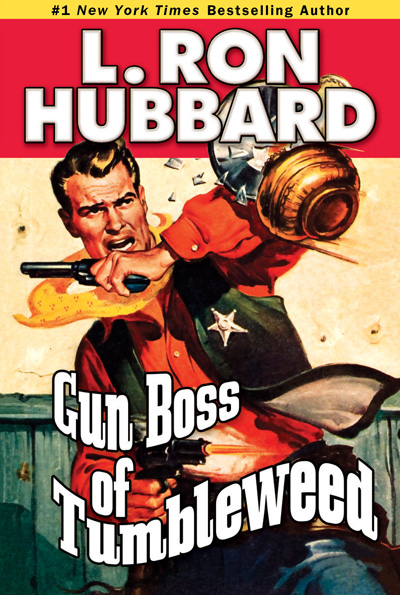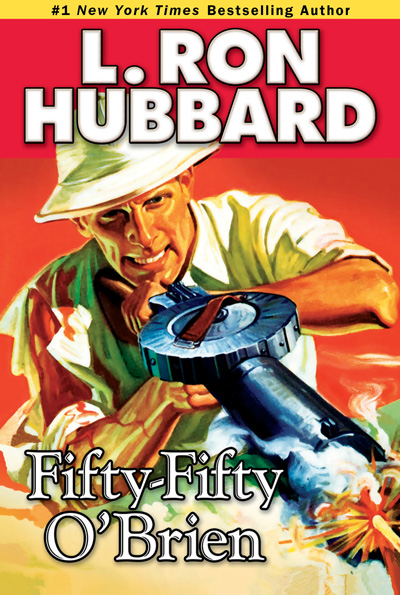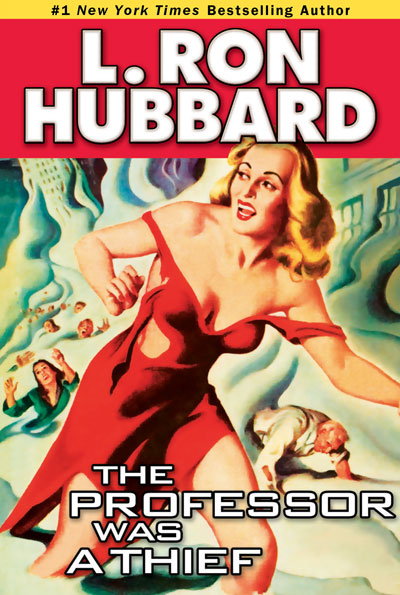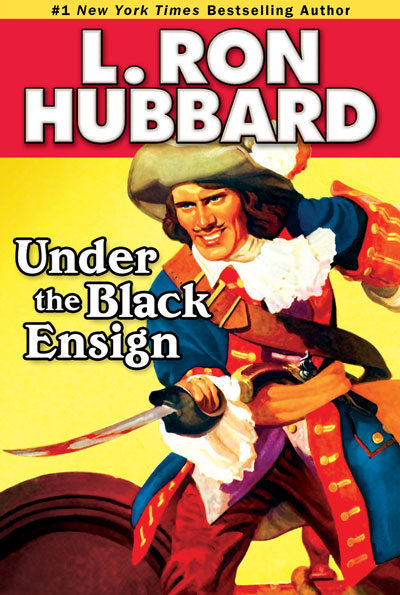Penniless, homeless, and virtually lifeless, the vagrant “Doughface” Jack is about to discover that where medical marvels meet the mysteries of the human mind, amazing things happen.
Riding the rails, Jack runs afoul of a local sheriff and ends up with a crushed skull. He’s as good as dead until a savvy country doctor performs a bit of medical magic. Jack wakes up to find that his brain has been drastically altered. He has the power to save lives—and destroy them—with a single glance.
Will Jack use his astounding power for good … or for evil? His journey of discovery takes him to New York and into the arms of a woman, who has a plan of her own. Together they’re bound for Washington, D.C., and a psychic adventure that could change the shape of history.
“…a series not to be missed by any true pulp-fiction fan.” —Comics Buyers Guide
SAMPLE
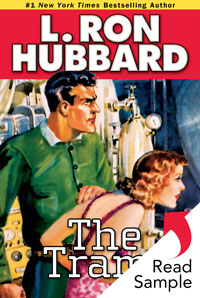
ABOUT THE AUTHOR
The Tramp was originally serialized in 1938 in three issues of Astounding Science Fiction. Its respected editor, John W. Campbell, wrote: “Hubbard is a very highly experienced writer, an author with a tremendous background of writing in every field. He’s one of the few professional writers I know of who gets a genuine kick out of the story he’s writing. In The Tramp, the suspense is intensified step by step, because every step points the same way. There are no backward slips, no scattered accidents that tend in any direction other than the one toward which Hubbard is driving.”
The Tramp Glossary
Stories from the Golden Age reflect the words and expressions used in the 1930s and 1940s, adding unique flavor and authenticity to the tales. While a character’s speech may often reflect regional origins, it also can convey attitudes common in the day. So that readers can better grasp such cultural and historical terms, uncommon words or expressions of the era, the following glossary has been provided.
alum: a colorless crystalline compound used as an astringent, causing contraction. Used figuratively.
brakie: brakeman; railroad man in charge of the brakes.
bulls: cops; police officers.
bumptious: crudely or loudly assertive.
bunko: a swindle in which a person is cheated at gambling, persuaded to buy a nonexistent, unsalable, or worthless object, or otherwise victimized.
burg: city or town.
camion: a low flat four-wheeled truck.
chumps: suckers; people who are gullible and easy to take advantage of.
collar advertisement: collar and shirt advertisements by J. C. Leyendecker (1874–1951), an illustrator and entrepreneur who defined an era of fashion in the early twentieth century. He painted strong, athletic men and created long-running characters for the Arrow collar man ads (Arrow was a brand of shirt), as well as many others.
consumption: wasting disease; progressive wasting of the body; tuberculosis.
cordovan: burgundy in color.
de facto: exercising power or serving a function without being legally or officially established.
deuce, what the: what the devil; expressing surprise.
dick: a detective.
dummy-chucker: chucking the dummy; a type of beggar who gets money by pretending to have a seizure.
El: elevated railway.
fifty-leven: an expression used to describe a huge number.
Friday, woman: girl Friday; an efficient and faithful woman aide or employee.
ginks: fellows.
G-men: government men; agents of the Federal Bureau of Investigation.
goldbrickin’: goldbricking; faking; posing; pretending to be something one is not.
governor: the head of the show.
hard lines: that’s tough; something that one says in order to express sympathy for someone.
jake: satisfactory; okay; fine.
jig time, in: rapidly; in no time at all.
Ladies’ Aid Societies: groups of women whose purposes included helping their local church and community. Often such groups conducted fundraising activities for their church and to aid impoverished members of the community.
Leavenworth: Fort Leavenworth; the site of a federal penitentiary in Kansas.
lucre: money, wealth or profit.
Mick: term for a person of Irish birth or descent.
mitt reader: palmist; palm reader.
Model T Ford: an automobile produced by Henry Ford’s Ford Motor Company from 1908 through 1927. It is generally regarded as the first affordable automobile, the car that “put America on wheels.”
nuts: 1. a source of joy and pleasure. 2. an exclamation of disgust or disappointment.
OD: (military) olive drab.
O Gay-Pay-Oo: a Soviet secret police agency originally called the GPU (pronounced Gay-Pay-Oo), which stood for “State Political Administration” and was later changed to OGPU when the Russian word for consolidated or unified was added to the name.
pince-nez: a pair of glasses held on the face by a spring that grips the nose.
Podunk: any small and insignificant or inaccessible town or village.
pogroms: organized, often officially encouraged massacres or persecutions of minority groups.
punk-water: the water that stands in rotten, decayed cavities of old trees. Called “spunk-water” by Mark Twain in Huckleberry Finn.
qui vive, on the: on the alert; vigilant.
razorback: circus day laborer; man who loads and unloads railroad cars in a circus.
right guy: good guy.
ringmaster: the circus Master of Ceremonies and main announcer. Originally, he stood in the center of the ring and paced the horses for the riding acts, keeping the horses running smoothly while performers did their tricks on the horses’ backs.
Rochambeau: statue of the American Revolutionary War hero, General Comte de Rochambeau, in Lafayette Park, Washington, DC. As a French aristocrat, Rochambeau equipped a ship at his own expense and joined the Americans’ fight for liberty and after the war he returned to France as a national hero. The statue was presented as a gift from France to the US in 1902 as a reaffirmation of Franco-American relations in the first years of the twentieth century.
rods: a portion of the undercarriage of a train, especially the coupler under a freight car.
scareheads: headlines in exceptionally large type.
Scheherazade: the female narrator of The Arabian Nights, who during one thousand and one adventurous nights saved her life by entertaining her husband, the king, with stories.
set her cap for me: pursue someone romantically; to try to win the favor of a man with a view to marriage.
slouch hat: a wide-brimmed felt hat with a chinstrap.
snipes: cigarette butts.
stateroom: a private room or compartment on a train, ship, etc.
Tommy gun: Thompson submachine gun; a light portable automatic machine gun.
took to his heels: ran away.
uppers, on my: on one’s uppers; poor; in reduced circumstances; first recorded in 1886, this term alludes to having worn out the soles of one’s shoes so badly that only the top portions remain.
Waldorf: The Waldorf=Astoria; a famous hotel in New York City known for its high standards and as a social center for the city.
whippersnapper: an impertinent young person, usually a young man, who lacks proper respect for the older generation; a youngster with an excess of both ambition and impertinence.








